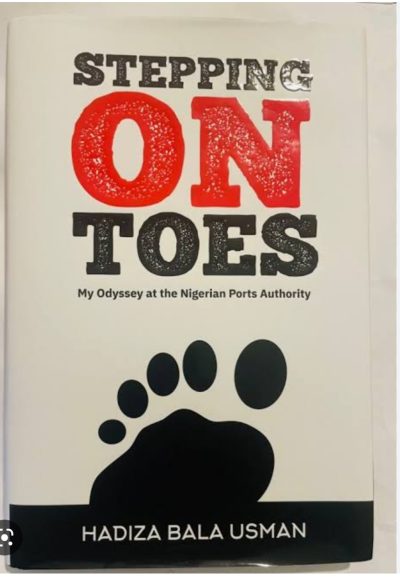Hadiza Bala Usman, a former Managing Director of the Nigerian Ports Authority, has revealed the real reason why she was sent packing
Amaechi was her former boss and supervising minister during her tenure in office.
Bala-Usman accused him of orchestrating her removal from office in February 2022 because she failed to lavish him with favours.
This and many more events and controversies during her time in NPA she detailed in her new book titled Stepping on Toes: My Odyssey at the Nigerian Ports Authority.

The Street Journal had reported that Bala-Usman was suspended from office in May 2021 following allegation of the NPA’s’s non-remittance of about N165 billion operating surpluses into the Consolidated Revenue Fund Account of the federation.
The suspension orders approved by Buhari followed a request for the probe of the accounts of the NPA made by Amaechi.
The minister subsequently set up an administrative panel of inquiry to investigate the affairs of the NPA, including awards of contracts from 2016 to May 2021.
He also asked the panel to examine and investigate compliance with communication channels as obtained in the public service.
The investigation, which lasted for about nine months, returned without proof of non-remittance, yet Bala-Usman was nonetheless removed from office and replaced with Mohammed Bello-Koko, who served as her executive director, finance and administration under her.
But in her memoir entitled, Bala-Usman said Amaechi held personal grudges against her because she failed to dispense favours, and that some of these inspired his decision to remove her at all costs. She alleged that the former minister said this much to some people who tried to mediate on the matter.
Interest groups and leaders of the All Progressives Congress (APC) also tried to intervene.
“I know, for instance, that governors elected on the platform of the APC, chaired by Governor Atiku Bagudu, deliberated on the issue of my suspension and constituted a committee to intervene,” the former NPA chief wrote in the book.
“The governors’ team met the Minister to discuss a resolution of the matter. He insisted that my management of the NPA had to be investigated because of the amount unremitted to the CFR (Consolidated Federation Revenue).
“He even tried to sway the governors’ resolve by suggesting to them that the budget of the NPA was bigger than most of their state budgets, so they shouldn’t bother about me.
“When the governors persisted, he told them that the matter was no longer within his purview and that they may need to approach the Head of Service of the Federation.
“He told another person who tried to intervene that I was so so selfish that I did nothing for him from the NPA, and never even gave him a birthday present!”
Bala-Usman also claimed to have had a personal reconciliatory meeting with the Minister during which Amaechi accused her of writing directly to the President without recourse to the minister.
She said the former minister told her that he took the steps against her because he no longer wanted her in the office and asked that she resigned voluntarily or challenge her suspension in court.
“I told him I wasn’t going to do either especially now that the probe panel was in place,” the author wrote in the memoir.
“The public service does not in fact accept resignations from staff under probe. I was convinced that doing either would make me appear guilty. I told him that I would rather wait for the panel to complete its task and present their findings, as I was sure I had done nothing wrong.”
Upon rejecting Amaechi’s advice, Bala-Usman claimed that the former minister “then told me that he would ensure that the investigation went on until 2022 when political activities would have started, and the president would not remember that I was still on suspension. He said what mattered to him was that I was no longer the MD of the NPA.”
Besides the above matters, the book indicate that Amaechi and Bala-Usman disagreed over the handling of some of the major operations at the agency.
She wrote that an unnamed stakeholder in the industry had warned her that the minister would want her out of office when two important contracts were due for renewal.
According to the book: “The first of this was the capital dredging contract and the second, the service boat management contract. While the minister demanded an extension of tenure of the companies providing capital dredging services without due process, he got approval for the restoration of an expired service boat contract. He got this even though the company was owing the federal government, had violated the Treasury Single Account policy, and above all longer had any contract with the NPA.”
